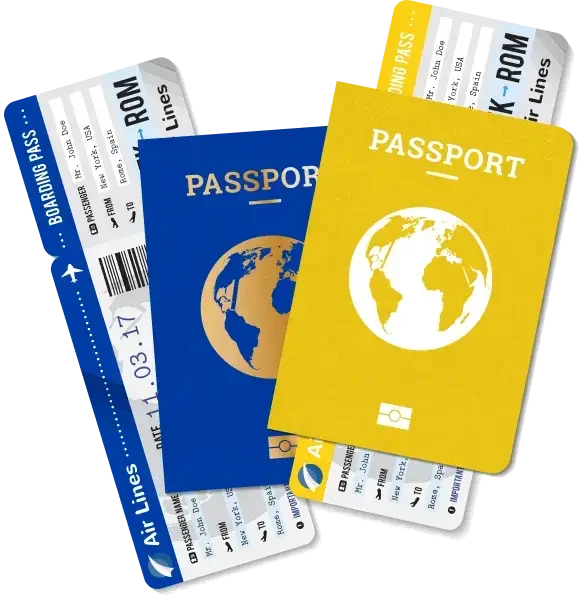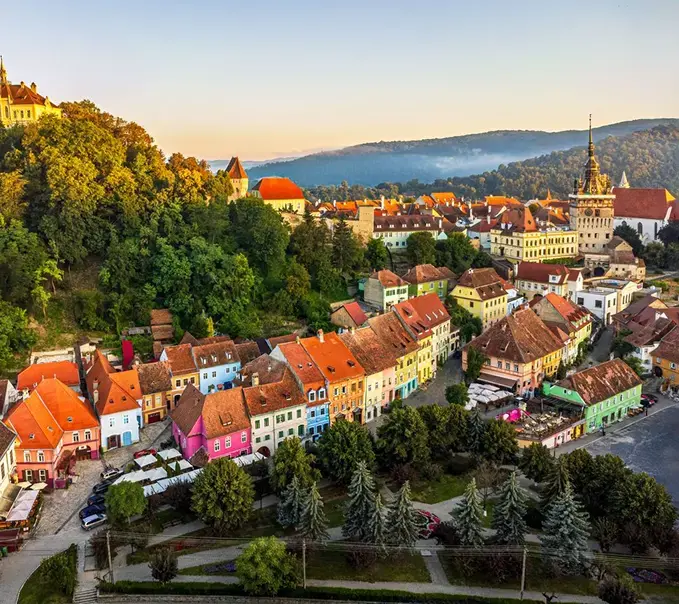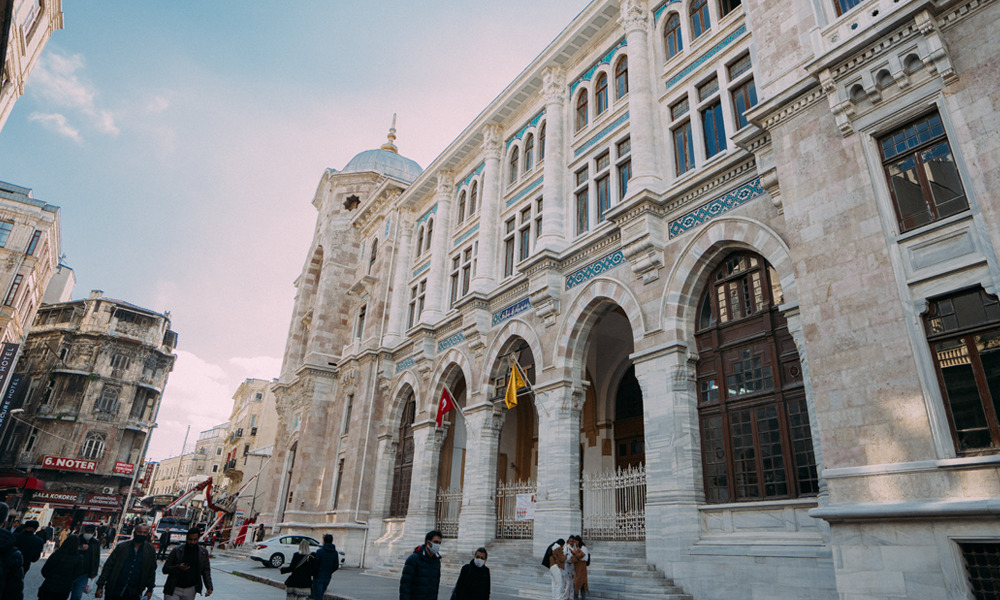Population
GDP (per capital)
Visa-Free Countries
GDP (purchasing power parity)
-
Immigration Pathways in Romania
-
As of 2025, Romania is emerging as an attractive destination for immigrants within the European Union. Strategically located at the crossroads of Central and Eastern Europe, it offers growing economic prospects, a vibrant cultural identity, and a relatively low cost of living. With modernizing infrastructure, an evolving labor market, and access to EU mobility, Romania appeals to professionals, entrepreneurs, and families seeking stability and opportunity in a dynamic and welcoming environment.
- Main Industries
- Agriculture and Food Production
- Machinery and Equipment Manufacturing
- Electronics and Electrical Goods
- Textile and Apparel Industry
- Automotive Parts Manufacturing
- Information and Communication Technology
- Chemical and Pharmaceutical Industry
- Construction and Real Estate

UTC+1
238,397 km2
Bucharest
Romanian leu (RON)
Romanian (official)
Hungarian, German, Roma

-
Recent Developments
- As of January 1, 2025, Romania has achieved full integration into the Schengen Area—marking a significant milestone in its European journey. This long-anticipated development now allows for seamless travel across most EU member states, eliminating internal border controls for both residents and visitors. The move not only enhances freedom of movement but also strengthens Romania’s position within the European Union, offering greater mobility for workers, entrepreneurs, and families alike. For many prospective immigrants, this advancement signals improved access to broader economic and educational opportunities throughout the continent.
-
Work-Based Immigration
-
Romania’s growing economy and strategic location within the European Union continue to attract foreign professionals and skilled workers. Depending on one’s nationality, the process for obtaining the right to work in Romania can vary significantly. Below is a breakdown of the current pathways for employment-based immigration, starting with the requirements for non-EU and non-EEA citizens.
Work Permits for Non-EU/EEA Nationals
Work Permits for Non-EU/EEA Nationals
For individuals coming from outside the European Union or European Economic Area, working in Romania involves a structured legal process. Obtaining a work permit is the first essential step, and it is important to understand who qualifies and what conditions must be met.
Who Is It For?
Individuals from countries outside the European Union (EU), European Economic Area (EEA), or Switzerland who wish to engage in employment within Romania.
Requirements
- Job Offer: A formal employment offer from a Romanian employer is mandatory.
- Employer's Role: The employer must initiate the work permit application with the Romanian General Inspectorate for Immigration (IGI).
- Documentation:
- Proof that the position cannot be filled by a Romanian or EU/EEA citizen.
- Applicant's qualifications and relevant experience.
- Medical certificate confirming fitness for work.
- Clean criminal record.
- Valid passport and other identification documents.
- Quota Consideration: Be aware that Romania has an annual quota for work permits; for 2025, the quota is set at 100,000 permits.
Fees
- Work Permit Application: Typically covered by the employer
- Long-Stay Employment Visa (D/AM): €120
Process Duration
- Work Permit Processing: Approximately 30 days.
- Long-Stay Visa Processing: Once the work permit is obtained, the visa application takes about 10 to 14 days.
- Post-Arrival: Within 90 days of entering Romania, the employee must apply for a Temporary Residence Permit, which generally takes 30 to 45 days to process.
Employment for EU/EEA/Swiss Citizens
Employment for EU/EEA/Swiss Citizens
Citizens of EU and EEA member states, along with Swiss nationals, benefit from simplified access to Romania’s labor market due to freedom of movement agreements. While a work permit is not required, certain administrative steps still apply to those planning longer stays.
Who Is It For?
Citizens of EU member states, EEA countries (Norway, Iceland, Liechtenstein), and Switzerland seeking employment in Romania.
Requirements
- No Work Permit Needed: Due to the EU's freedom of movement principles, these citizens can work in Romania without a work permit.
- Registration: If planning to stay longer than 90 days, individuals must register with the General Inspectorate for Immigration and obtain a residence certificate.
- Documentation:
- Valid national ID or passport.
- Proof of employment or sufficient financial means.
- Health insurance coverage.
- Proof of accommodation in Romania.
Fees
Registration Fee: Generally minimal; specific amounts may vary and should be confirmed with local immigration offices.
Process Duration
Registration Processing: Typically completed within a few weeks, depending on the local office's workload.
-
Study and Research Opportunities in Romania
- With its internationally recognized universities, affordable tuition, and vibrant student life, Romania has become an increasingly popular destination for academic pursuits. Whether you're planning to enroll in a full-degree program or conduct research, understanding the visa process is the first step for students arriving from outside the EU/EEA.
-
Student Visas for Non-EU/EEA Nationals
- Romania continues to be an attractive destination for international students, offering a blend of high-quality education and rich cultural experiences. For non-EU/EEA nationals aspiring to pursue studies in Romania, obtaining a long-stay visa (Type D) is a crucial step.
-
Requirements
To apply for a Romanian student visa, applicants must provide: - Letter of Acceptance: Issued by the Romanian Ministry of Education, confirming admission to a recognized educational institution.
- Completed Visa Application Form: Accurately filled and signed.
- Valid Passport: With a validity extending at least six months beyond the intended stay.
- Proof of Tuition Payment: Evidence of payment for at least one academic year.
- Proof of Financial Means: Bank statements or other documents demonstrating sufficient funds (approximately €2,500) to cover living expenses.
- Health Insurance: Valid in Romania for the entire duration of the stay.
- Police Clearance Certificate: A document confirming the absence of a criminal record.

Upon arrival in Romania, students must register with the local Immigration Office within 90 days to obtain a residence permit. This permit is typically valid for one year and is renewable annually.

- Fees:
- Visa Application Fee: Approximately €120.
- Residence Permit Fee: Around RON 259.
- Process Duration:
- Visa Processing Time: Typically ranges from 30 to 60 days, depending on the Romanian consulate or embassy.
- Residence Permit Issuance: Generally completed within 30 days after registration in Romania.
-
Post-Graduation Opportunities
- Graduates from Romanian universities have several avenues to extend their stay and build a professional career:
Transition to Employment:
Graduates can apply for a work permit if they secure a job offer in Romania. The employer typically initiates this process.
Entrepreneurship:
Starting a business is another viable option, requiring compliance with Romanian business regulations and obtaining the necessary permits.
Further Studies:
Pursuing advanced degrees (Master’s or Ph.D.) allows students to extend their residence permits accordingly.
Family Reunification in Romania (2025)
Family Reunification in Romania (2025)
Reuniting with loved ones remains a cornerstone of Romania’s immigration policy. In 2025, the country continues to facilitate family reunification for eligible residents, ensuring that families can live together while adhering to legal requirements.
Requirements
Applicants must provide the following documentation:
- Proof of Relationship: Marriage certificates for spouses, birth certificates for children, and other documents verifying familial ties.
- Accommodation Evidence: Documents demonstrating adequate living conditions in Romania.
- Financial Means: Proof of sufficient income to support family members, typically at least the national minimum wage per family member.
- Health Insurance: Valid medical insurance covering the entire duration of stay.
- Criminal Record Certificate: Issued by authorities in the applicant's country of residence.
Additional documents may be required based on individual circumstances.
Eligibility Criteria
To initiate the family reunification process, the sponsor—either a Romanian citizen or a foreign national with legal residency—must meet specific conditions:
- Legal Residency: The sponsor must hold a valid residence permit, such as a temporary residence permit, EU Blue Card, ICT permit, or long-term residence permit.
- Eligible Family Members: These include the spouse, unmarried minor children (including adopted children), and, in certain cases, dependent parents or adult children unable to support themselves due to medical reasons.
Fees
- Visa Application Fee: Approximately €120.
- Residence Permit Fee: Around RON 259.
Application Process
- Approval Request: The sponsor submits a family reunification application to the General Inspectorate for Immigration (IGI) in Romania, including all necessary documentation.
- Approval Certificate: Upon approval, the IGI issues a certificate, which the sponsor sends to the family member(s) abroad.
- Visa Application: Family members apply for a long-stay visa (D/VF) at the Romanian embassy or consulate in their country, presenting the approval certificate and required documents.
- Entry and Residence Permit: After entering Romania, family members must apply for a temporary residence permit at the local IGI office within 90 days.
Process Duration
- Approval Certificate: Processing can take up to 90 days.
- Visa Processing: Generally completed within 30 days.
- Residence Permit Issuance: Typically finalized within 30 days after application in Romania.
Digital Nomad Visa in Romania (2025)
Digital Nomad Visa in Romania (2025)
In response to the evolving landscape of remote work, Romania has introduced a Digital Nomad Visa, effective from 2025. This initiative allows non-EU/EEA remote workers to reside in Romania for extended periods while continuing their professional activities for employers or clients based outside the country. The visa not only offers an opportunity to experience Romania’s rich cultural heritage and affordable living but also positions the nation as a competitive destination for global digital professionals.
Eligibility and Requirements
To qualify for Romania's Digital Nomad Visa, applicants must meet the following criteria:
- Non-EU/EEA Citizenship: The visa is available exclusively to individuals who are not citizens of EU or EEA countries.
- Proof of Remote Employment: Applicants must demonstrate that they are employed by or own a company registered outside Romania, or that they provide services to clients predominantly located abroad.
- Minimum Income Threshold: A verifiable monthly income of at least €3,700 (approximately $4,000) is required. This can be substantiated through employment contracts, bank statements, or other financial documents.
- Health Insurance: Valid health insurance coverage for the duration of the stay in Romania, with a minimum coverage of €30,000, is mandatory.
- Accommodation Proof: Evidence of accommodation in Romania, such as a rental agreement or property ownership documents, must be provided.
- Clean Criminal Record: A police clearance certificate from the applicant's country of residence is required to demonstrate good conduct.
- Letter of Intent: A personal statement outlining the purpose of the stay and commitment to comply with Romanian laws.
Fees
- Visa Application Fee: Approximately €120, payable upon submission of the application.
- Residence Permit Fee: Upon arrival in Romania, digital nomads must apply for a residence permit, which also incurs a fee of around €120.
Application Process and Duration
- Application Submission: Applicants can apply online through Romania's official eVisa platform or at the nearest Romanian embassy or consulate.
- Processing Time: The visa processing period typically ranges from 10 to 14 working days. It is advisable to apply at least three months before the intended travel date to accommodate any unforeseen delays.
- Post-Arrival Requirements: Within 90 days of entering Romania, visa holders must apply for a temporary residence permit at the General Inspectorate for Immigration. This permit is usually valid for one year and can be renewed for an additional year, provided the applicant continues to meet the eligibility criteria.
-
Citizenship and Long-Term Residency in Romania
- Romania offers clear pathways for foreign nationals seeking permanent residency or citizenship, helping them build a stable future in the country.
-
Permanent Residency
- After five continuous years of legal residence, non-EU/EEA nationals can apply for permanent residency. This status grants the right to stay indefinitely with fewer formalities.
- Key Requirements:
- Continuous legal residence for at least five years (limited absences allowed)
- Proof of stable income and valid health insurance
- Evidence of accommodation
- Clean criminal record
- Basic Romanian language skills
- Applications are submitted to the General Inspectorate for Immigration and usually processed within six months. Successful applicants receive a permanent residence card, valid for ten years.


-
Naturalization (Citizenship)
- Foreigners can request Romanian citizenship after eight years of legal residence—or five if married to a Romanian citizen. Applicants must demonstrate:
- Proficiency in Romanian (generally B1 level)
- Knowledge of Romanian culture and laws
- Good moral character with no criminal record
- Financial self-sufficiency
- Loyalty to Romania
Conclusion
In summary, Romania’s pathways to permanent residency and citizenship are thoughtfully designed to encourage long-term commitment and cultural integration. By meeting the residency, language, and legal requirements, foreign nationals can enjoy the benefits of stability, security, and full participation in Romanian society. Whether seeking to settle permanently or become a citizen, Romania offers clear and accessible options for those ready to embrace a new chapter in this vibrant European country.
FAQ about Immigration Pathways in Romania (2025 Edition)
1. How long must I live in Romania before applying for permanent residency?
You need to have legally and continuously resided in Romania for at least five years to be eligible for permanent residency.
2. Do EU/EEA citizens need a work permit to work in Romania?
No, EU/EEA citizens do not require a work permit but must register their residence with the General Inspectorate for Immigration.
3. What are the main requirements for Romania’s Digital Nomad Visa?
Applicants must be non-EU/EEA remote workers, show proof of remote employment, meet a minimum income threshold, have health insurance, and provide accommodation proof.
4. How long does it take to become a Romanian citizen through naturalization?
The naturalization process typically takes between six months and two years, depending on the applicant’s circumstances and compliance with residency and integration criteria.
Looking for expert visa support?
PROGRAM MATCH
Compare the different programs in a nutshell and discover their features
PROGRAM COST
Check the cost estimates for each offered program
PROGRAM MAP
Explore the power of global mobility for every passport in the world
